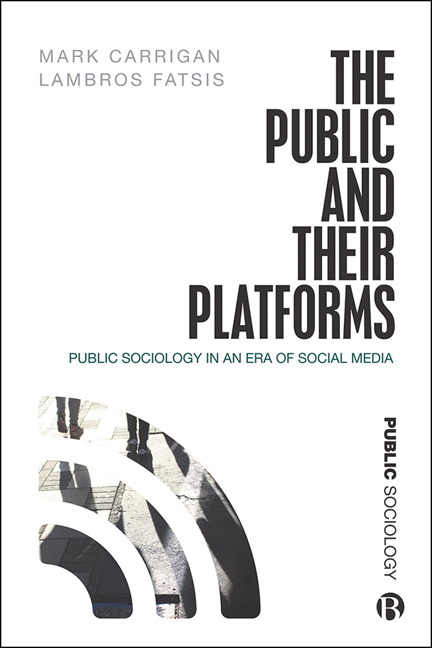Book contents
- Frontmatter
- Contents
- Acknowledgements
- Series Editors’ Preface
- Introduction
- 1 Defining ‘the Public’
- 2 The History of Platforms
- 3 Between Publics and Platforms
- 4 Sociology and its Platforms
- 5 The Past, Present and Future of Public Sociology
- 6 Making Sociology Public
- 7 Making Platforms Public
- 8 Assembling Public Sociology
- Notes
- References
- Index
Series Editors’ Preface
- Frontmatter
- Contents
- Acknowledgements
- Series Editors’ Preface
- Introduction
- 1 Defining ‘the Public’
- 2 The History of Platforms
- 3 Between Publics and Platforms
- 4 Sociology and its Platforms
- 5 The Past, Present and Future of Public Sociology
- 6 Making Sociology Public
- 7 Making Platforms Public
- 8 Assembling Public Sociology
- Notes
- References
- Index
Summary
Sociology is a highly reflexive subject. All scholarly disciplines examine themselves reflexively in terms of theory and practice as they apply what the sociologist of science Robert Merton once called ‘organised scepticism’. Sociology adds to this constant internal academic debate also a vigorous, almost obsessive, concern about its very purpose and rationale. This attentiveness to founding principles shows itself in significant intellectual interest in the ‘canon’ of great thinkers and its history as a discipline, in vigorous debate about the boundaries of the discipline, and in considerable inventiveness in developing new areas and subfields of sociology. This fascination with the purpose and social organization of the discipline also reflects in the debate about sociology's civic engagements and commitments, its level of activism, and its moral and political purposes.
This echoes the contemporary discussion about the idea of public sociology. ‘Public sociology’ is a new phrase for a long-standing debate about the purpose of sociology that began with the discipline's origins. It is therefore no coincidence that students in the 21st century, when being introduced to sociology for the first time, wrestle with ideas formulated centuries before, for while social change has rendered some of these ideas redundant, particularly the Social Darwinism of the 19th century and functionalism in the 1950s, familiarity with these earlier debates and frameworks is the lens into understanding the purpose, value and prospect of sociology as key thinkers conceived it in the past. The ideas may have changed but the moral purpose has not.
A contentious discipline is destined to argue continually about its past. Some see the roots of sociology grounded in medieval scholasticism, in 18th century Scotland, with the Scottish Enlightenment's engagement with the social changes wrought by commercialism, in conservative reactions to the Enlightenment or in 19th century encounters with the negative effects of industrialization and modernization. Contentious disciplines, however, are condemned to always live in their past if they do not also develop a vision for their future; a sense purpose and a rationale that takes the discipline forward. Sociology has always been forward looking, offering an analysis and diagnosis of what C. Wright Mills liked to call the human condition.
- Type
- Chapter
- Information
- The Public and their PlatformsPublic Sociology in an Era of Social Media, pp. vii - xiiPublisher: Bristol University PressPrint publication year: 2021

